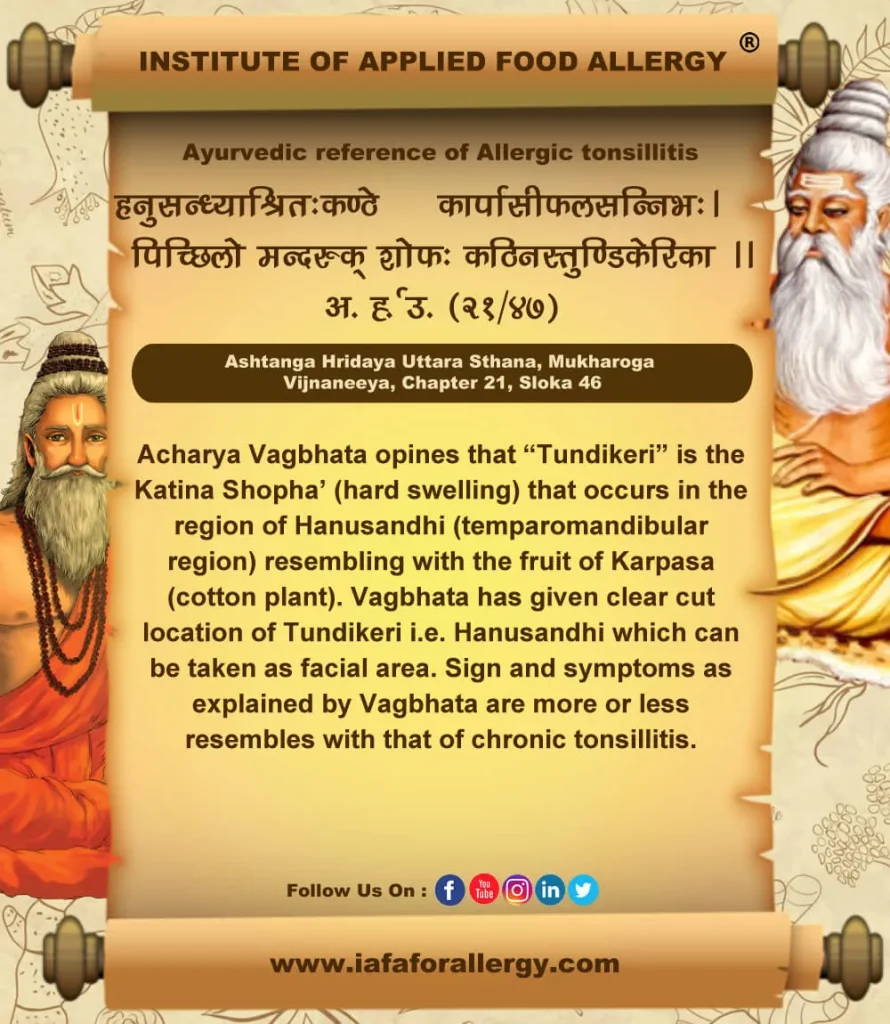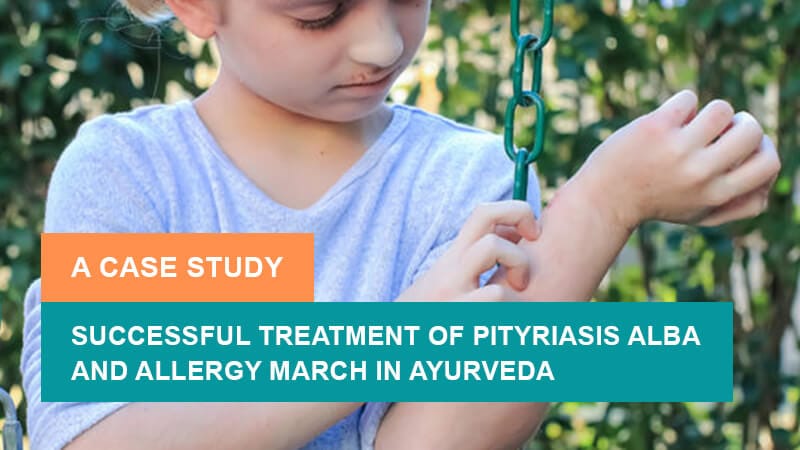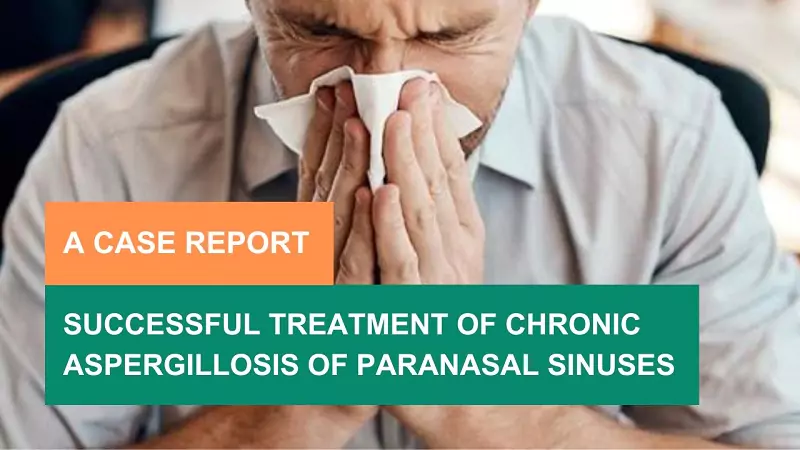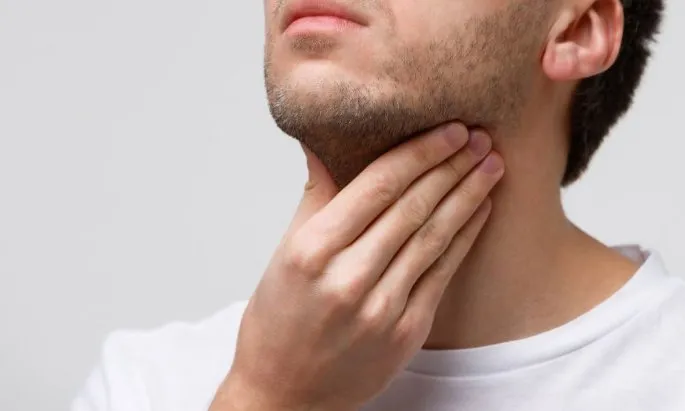On This Page
Allergic Tonsillitis (Tundikeri) – Causes, Symptoms, and Ayurvedic Treatment
हनुसन्ध्याश्रितः कण्ठे कार्पासीफलसन्निभः।
पिच्छिलो मन्दरुक् शोफः कठिनस्तुण्डिकेरिका ।।
Tonsils and adenoids are the body’s first line of defense at the oro-pharyngeal gateway. They “sample” bacteria and viruses that enter the body through the mouth or nose at the risk of their own infection. Tonsillitis refers to inflammation of the pharyngeal tonsils (glands at the back of the throat, visible through the mouth). The inflammation may involve other areas of the back of the throat, including the adenoids and the lingual tonsils (tonsil tissue at the back of the tongue). There are several variations of tonsillitis: acute, recurrent, and chronic tonsillitis, and peritonsillar abscess. It’s most common in children aged 3 to 7, who have larger tonsils than adults and older children. However, it is estimated that 15% of all visits to family doctors are because of chronic tonsillitis.
A disease which is similar to tonsillitis in clinical presentation in Ayurveda is Tundikeri which is described under Mukha Roga. The disease Tundikeri is highly prevalent disease but there is very less explanation in Ayurvedic classics regarding the description of disease and its management. The word Tundikeri is made up of two words i.e. Tundi and Keri. Tundi means mouth and Keri means location. So in total Tundikeri refers to the disease that occurs in the region of the mouth.
Causes of Allergic Tonsillitis (Tundikeri)
Most common causes of allergic tonsillitis include:-
- Allergies, like hay fever (allergic rhinitis) or allergies affecting the nose
- Sinus infection
In Ayurveda, Indralupta is caused by vitiation of Vata dosha along with Pithadosha in hair follicles. Kapha dosha along with Raktadathu forms a covering in these follicles and prevents the formation of new hairs.
Symptoms of Allergic Tonsillitis (Tundikeri)
- Recurrent attacks of sore throat or acute tonsillitis.
- Chronic irritation in the throat with cough.
- Bad taste in the mouth.
- Foul breath (halitosis) due to pus in crypts.
- Thick speech (hoarseness of voice).
- Difficulty in swallowing.
- Choking spells at night (when tonsils are large and obstructive).
Ayurvedic Reference of Allergic Tonsillitis (Tundikeri)


“Dr. Gupta’s IAFA aspires to be the destination of choice for people seeking authentic Ayurveda healthcare. Institute of Applied Food Allergy® is considered to be the best in Ayurveda and also seamless diagnostic as well as therapeutic solution”.
Uncompromising Excellence. Commitment to Care...!!! Dr. Gupta’s IAFA for your future health.
– Dr. Sahil Gupta (B.A.M.S., M.H.A.)
Ayurvedic Allergy Specialist
CEO & Founder of IAFA®
At last, Easier Allergic Tonsillitis Management

Trusted by
More than 90,000 Patients

Convenient
at-Home Treatments

9.2 / 10
Customer Satisfaction Score
Ayurvedic Treatment for Allergic Tonsillitis
The management of Tundikeri is dealt in three ways – medical, para surgical and surgical management.
Internal Medicines for Allergic Tonsillitis
- Bharngyadi Kashaya
- Dashamulakatutraya Kashaya
- Indukantham Kashaya
- Pathyakatphaladi Kashaya
- Sudarsana Choorna
- Talisapatradi Choorna
- Triphala Choorna
- Agastya Rasayana
- Dashamulaharitaki Lehya
- Madhusnuhi Rasayana
- Shiva Gutika
- Khadiradi Vati
- Jathyadi Gutika
- Panchakola Gutika
Para Surgical Management of Allergic Tonsillitis
The para surgical management of Tundikeri can be done with:
- Raktamokshana
- Kavala-Gandusha
- Pratisarana
- Kshara Karma: Apamarga Kshara is widely used in cases of chronic tonsillitis.
Surgical Management
Shastrakarma elaborated for Galashundi (Chedana-excision) can be adopted in Tundikeri.
Single Drugs Used in Allergic Tonsillitis
- Vasa (Adhatoda vasica)
- Madhuyasti (Glycirrhiza glabra)
- Bharangi (Clerodendrum serratum)
- Vibhitaka (Terminalia bellerica)
- Surasa (Ocimum sanctum)
- Shirisha (Albizia lebbek)
- Haridra (Curcuma longa)
Diet Management in Allergic Tonsillitis
Pathya (Do’s)
- Dantadhavana (brushing), Kavala (gargling) are measured to maintain oral hygiene, avoidance of which leads to Kapha Dosha vitiation.
Apathya (Don’ts)
- Avoid Sleeping in prone position (Avaksayanam)
- Avoid continuous usage of excessive fish, meat of buffalo, pork, uncooked Mulaka(radish), soup of black gram, curd, milk, Suktha, sugar cane juice,
- Taking bath daily after heavy diet
- Indigestion
- Drinking / bathing in cold water
- Excessive talking after eating, and suppression of natural urges
Yoga Therapy in Allergic Tonsillitis
Postures include:-
- Ustrasana
- Dhanurasana
- Baddha konasana
Pranayama include:-
Nadi-shodhana Pranayama leads to a marked improvement in lung functions by strengthening the respiratory muscles and decreasing the resistance to the airflow in the lungs.

Frequently Asked Questions
Question: What is Allergic tonsillitis?
Answer: Allergic Tonsillitis is an infection of the tonsils that causes inflammation. It’s most common in children aged 3 to 7.
Question: What are the causes of Allergic tonsillitis?
Answer: Allergic tonsillitis is caused due to allergic exposure to an allergen and occurs when congestion in the nose and sinuses drains down to the throat
Question: What is the Ayurvedic treatment for Allergic tonsillitis?
Answer: Along with internal medications, Para surgical and surgical treatment have a major role in allergic tonsillitis.
Question: Can Ayurveda treat Allergic Tonsillitis?
Answer: Yes, Ayurveda can treat Allergic Tonsillitis effectively by eradicating the root cause and fortifies the body against further attacks.
Question: How Ayurveda treats Allergic Tonsillitis?
Answer: The management of Allergic Tonsillitis in Ayurveda includes a combination of a variety of aushadhi (herbal medications), ahar (changes in diet) and vihar (changes in lifestyle).
Question: What is the Ayurvedic perspective of Allergic Tonsillitis?
Answer: In Ayurveda, allergic tonsillitis is termed as Tundikeri which is mainly caused due to the accumulation of toxins due to improper digestion and poor defense mechanism.This condition is managed by Vata and Kapha dosha pacifying herbs, immuno-modulators etc.
References
- Acharaya J.T. 1st ed. Chaukhambha Surbharati Prakashan; Varanasi: 2003. Sushrut Samhita of Sushruta.
- Shastry J. L.N. 2nd ed. Chaukhambha Orientalia; Varanasi: 2005. Illustrated Dravyaguna Vijnana.
- Vagbhata. Ashtanga Hridya edited with Vidyotini Hindi commentary, Uttaratantra. Edited by Kaviraj Atridev Gupta and Vaidya Yadunandana Upadhyaya. 14th ed. Varanasi: Chaukhambha Sanskrit Sansthan; 2003. p.717
- Sahil Gupta, Ayurvedic Aspects of Allergies and Fungal Infections, Edition 2021, Allergic Tonsillitis Chapter No. 48, Page No. 299-303.
Was this Page Helpful?
So IAFA Root – Cause Treatment of Your Allergic Tonsillitis is Just 3 Steps Away!

01. Connect With Us
Share your history of illness or Book your appointment

02. Consult With Us
Dr. Gupta a certified Ayurvedic Allergist Consultant

03. Root Cause Treatment
Get an accurate diagnosis, medicines, diet & lifestyle change
Allergic Tonsillitis – Case Studies
Real Case Studies of Successfully Treated Patients from All Around the World by IAFA Ayurveda®
-

Successful Treatment of Pityriasis Alba and Allergy March in Ayurveda – A Case Study
It is a case study about successful treatment of Pityriasis Alba and…
-

Successful Treatment of Gallstones (Cholelithiasis) with Ayurvedic Medications – A Case Study
It is a case study about the successful treatment of Gallstones (Cholelithiasis)…
-

48-Year-Old Male Patient Got Relief from Chronic Aspergillosis of Paranasal Sinuses – A Case Study
Fungal infections can be treated with a high success rate by various…
-

6-Year-Old Child Patient Got Relief from Gluten Intolerance and Wheat Allergy – A Case Study
It is a case study of a 6-year-old Child Patient who got…











